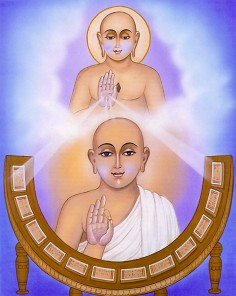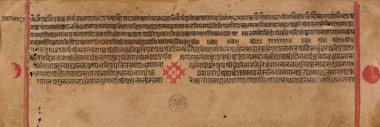Twenty-Fourth Lecture: The Samitis
The eight articles[1] of the creed are the Samitis and the Guptis; there are five Samitis and three Guptis. (1)
The Samitis[2] are: 1. īryā-samiti (going by paths trodden by men, beasts, carts, etc., and looking carefully so as not to occasion the death of any living creature); 2. bhāṣā-samiti (gentle, salutary, sweet, righteous speech); 3. ēṣaṇā-samiti (receiving alms in a manner to avoid the forty-two faults that are laid down); 4. ādāna-samiti (receiving and keeping of the things necessary for religious exercises, after having carefully examined them); 5. uccāra-samiti (performing the operations of nature in an unfrequented place). The three Guptis (which are here included in the term Samiti in its wider application) are: 1. mano-gupti (preventing the mind from wandering in the forest of sensual pleasures by employing it in contemplation, study, etc.); 2. vāg-gupti (preventing the tongue from saying bad things by a vow of silence, etc.); 3. kāya-gupti (putting the body in an immovable posture as in the case of Kāyōtsarga). (2)
The eight Samitis are thus briefly enumerated, in which the whole creed taught by the Jinas and set forth in the twelve Angās, is comprehended. (3)
1. The walking of a well-disciplined monk should be pure in four respects: in respect to 1. the cause;[3] 2. the time; 3. the road; 4. the effort.[4] (4)
The cause is: knowledge, faith, and right conduct; the time is day-time; the road excludes bad ways. (5)
The effort is fourfold, viz. as regards: 1. substance, 2. place, 3. time, and 4. condition of mind. Hear me explain them. (6)
With regard to substance: the (walking monk) should look with his eyes; with regard to place: the space of a yuga (i.e. four hastas or cubits); with regard to time: as long as he walks; and with regard to condition of mind: carefully.[5] (7)
He walks carefully who pays attention only to his walk and his body (executing it), whilst he avoids attending to the objects of sense, but (minds) his study, the latter in all five ways.[6] (8)
2. To give way to: anger, pride, deceit and greed, laughter, fear, loquacity and slander;[7] these eight faults should a well-disciplined monk avoid; he should use blameless and concise speech at the proper time. (9, 10)
3. As regards begging,[8] a monk should avoid the faults in the search,[9] in the receiving,[10] and in the use[11] of the three kinds of objects, viz. food, articles of use, and lodging. (11)
A zealous monk should avoid in the first (i.e. in the search for alms) the faults occasioned either by the giver (udgama) or by the receiver (utpādana); in the second (i.e. in the receiving of alms) the faults inherent in the receiving; and in the use of the articles received, the four faults.[12] (12)
4. If a monk takes up or lays down the two kinds of things belonging to his general and supplementary[13] outfit, he should proceed in the following way. (13)
A zealous monk should wipe the thing after having inspected it with his eyes, and then he should take it up or put it down, having the Samiti in both respects.[14] (14)
5. Excrements, urine, saliva, mucus, uncleanliness of the body, offals of food, waste things, his own body (when he is about to die), and everything of this description (is to be disposed of in the way to be described). (15)
[A place may be not frequented and not seen (by people), or not frequented but seen, or frequented and not seen, or frequented and seen. (16)][15]
In a place neither frequented nor seen by other people, which offers no obstacles to self-control, which is even, not covered with grass or leaves[16], and has been brought into its present condition[17] not long ago, which is spacious, has an inanimate surface-layer,[18] not too near (the village, etc.), not perforated by holes, and is exempt from insects and seedsin such a place he should leave his excrements, etc. (17, 18)
The five Samitis are thus briefly enumerated, I shall now explain in due order the three Guptis.[19] (19)
1. There is, 1. truth; 2. untruth; 3. a mixture of truth and untruth; 4. a mixture of what is not true, and what is not untrue. The Gupti of mind refers to all four.[20] (20)
A zealous monk should prevent his mind from desires for the misfortune of somebody else,[21] from thoughts on acts which cause misery to living beings,[22] and from thoughts on acts which cause their destruction.[23] (21)
2. The Gupti of speech is also of four kinds (referring to the four divisions as in verse 20). (22)
A zealous monk should prevent his speech from (expressing) desires, etc. (as in verse 21). (23)
3. In standing, sitting, lying down, jumping, going, and in the use of his organs, a zealous monk should prevent his body from intimating obnoxious desires, from doing acts which cause misery to living beings, or which cause their destruction. (24, 25)
These are the five Samitis for the practice of the religious life, and the Guptis for the prevention of everything sinful. (26)
This is the essence of the creed, which a sage should thoroughly put into practice; such a wise man will soon get beyond the Circle of Births. (27)
Thus I say.
The word I have rendered "article" is māyā, the Sanskrit form of which may be mātā or mātrā. The word is derived from the root mā "to find room in," and denotes that which includes in itself other things, see verse 3. The word may also mean mātri "mother," as Weber understands it. But this is an obviously intentional double meaning.
The definitions placed in parentheses in the text are taken from Bhandarkar's Report for 1883-1884, p. 98, note , p. 100, note *.
The "five ways" are vāchanā, etc., as explained in the Twenty-ninth Lecture, §§ 19-23, below, p. 165 f. The commentators supply kuryāt "he should carry on his study."
Vikahā = vikathā, which does not occur in common Sanskrit. Perhaps it stands for vikatthā "boasting."
There are altogether forty-six faults to be avoided. As they are frequently alluded to in the sacred texts, a systematically enumeration and description of them according to the Dīpikā will be useful.
There are sixteen udgama-dōṣas by which food, etc. becomes unfit for a Jaina monk:
- Ādhākarmika, the fault inherent in food, etc., which a layman has prepared especially for religious mendicants of whatever sect.
- Auddēśika, is food, etc., which a layman has prepared for a particular monk.
- Pūtika, is food, etc., which is pure on the whole, but contains particles impure on account of the first fault.
- Unmiśra, is food, etc., of which a part only had been especially prepared for the monk in question.
- Sthāpanākarmika, is food, etc., which has been reserved for the monk.
- Prābhṛtika, is food, etc., which has been prepared for some festivity.
- Prāduḥkaraṇa, when the layman has to light a lamp in order to fetch the alms for the monk.
- Krīta, when he has to buy the things.
- Prāmitya, when he has to fetch a ladle (? uddhāraka) in order to draw out the food, etc.
- Parāvṛtti, when he replaces bad particles of the food by good ones, and vice versa.
- Adhyāhṛta, when he has to fetch the food, etc., from some distance.
- Udbhinna, when he has to open locks before he gets at the food, etc.
- Mālāhṛta, when he has to take the food, etc., from some raised or underground place.
- Ācchidya, when the food, etc., was taken by force from somebody.
- Anisṛṣṭa, when a man gives from a store he possesses in common with other men, without asking their permission.
- Adhyavapūra, when the mendicant calls while the dinner is being cooked, and for his sake more food is put in the pot on the fire.
(Some of these faults are enumerated in the Aupapātika Sūtra, § 96, III.)
There are sixteen utpādana-dōṣas; or such faults as are occasioned by the monk's using some means to make the layman give him alms:
- Dhātrīkarman, when the monk plays with the layman's children.
- Dūtakarman, when he gives him information about what his people are doing.
- Nimitta, when he speaks in praise of almsgiving.
- Ājīvikā, when he makes his birth and family known to him.
- Vapanīka, when he expatiates upon his misery.
- Chikitsā, when he cures sick people.
- Krōdhapiṇḍa, when he extorts alms by threats.
- Mānapiṇḍa, when he tells the layman that he has laid a wager with other monks that he would get alms from him.
- Māyāpiṇḍa, when he employs tricks or buffoonery in order to procure alms.
- Lōbhapiṇḍa, when he goes begging from a desire of good fare.
- Saṃstava-piṇḍa, when he flatters the layman.
- Vidyāpiṇḍa, when he makes a show of his learning; or when he conjures a god from whom to get alms.
- Mantradōṣa, when he obliges the layman in some way or other.
- Chūrṇayōga, when he makes himself invisible and then takes away the food, etc.
- Yōgapiṇḍa, when he teaches people spells, tricks, etc.
- Mūlakarman, when he teaches them how to obviate evils by roots, charms, etc.
There are ten faults of grahaṇaiṣaṇā:
- Saṅkita, when a monk accepts alms from a frightened layman.
- Mrakṣita, when the food is soiled (kharaṇṭita) by animate or inanimate matter.
- Nikṣipta, when the food is placed among animate things.
- Pihita, when animate food is covered with inanimate matter, and vice versa.
- Saṃhṛta, when the layman has to take out the thing to be given from one vessel and puts it into another.
- Dāyaka, when the condition or occupation of the giver forbids accepting alms from him.
- Unmiśrita, when the layman mixes up pure with impure food.
- Aparita (?), when one joint possessor gives away from the store against the other's will.
- Lipta, when the layman gives food, etc., with a ladle or his hand, soiled with milk, butter, etc.
- Chardita, when in giving alms he spills milk, etc.
There are four faults of paribhōgaiṣaṇā:
- Saṃyōjanā, when the monk puts together the ingredients for a good meal.
- Apramāṇa, when he accepts a greater than the prescribed quantity of food.
- Iṅgāla, when he praises a rich man for his good fare, or dhūma, when he blames a poor man for his bad fare.
- Akāraṇa, when he eats choice food on other occasions than those laid down in the sacred texts.
Aughika and aupagrahika. The former is explained sāmudāyika, the other denotes such things as are wanted occasionally only, as a stick. I cannot make out with certainty from the commentaries whether the broom is reckoned among the former or the latter.
This means, according to the commentator, either in taking up or putting down, or with respect to the ōgha and aupagrahika outfit, or with respect to substance and condition of mind.
This verse, which is in a different metre (āryā), is apparently a later addition, and has probably been taken from an old commentary, the Chūrṇi or the Bhāṣya.
Ajjhusirē = asuṣirē, not perforated, not having holes. I translate according to the author of the Avachūri. The literal translation would give a wrong idea, as it would come to the same as the word bilavarjita in the next verse.
 Ganadhar Sudharma Swami
Ganadhar Sudharma Swami
